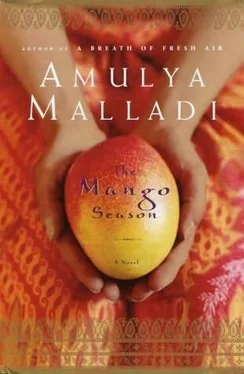I shook my head. Sowmya knew better than anyone that a daughter was a piece of property, something you unloaded after a certain point. Sowmya had already become excess baggage and my grandparents were waiting to get her married and out of their house.
In Telugu, the word for girl is adapilla, where ada means theirs and pilla means girl. In essence, the creators of the language had followed the rules of society and deemed that a girl was never her parents’, always the in-laws’, always belonging to someone else rather than to those who birthed and raised her.
“But I’m not just a daughter, I am me,” I said wearily, trying not to sound like a cliché. “No one seems to give a damn about me. Everyone is interested in their daughter, granddaughter…” I let my words trail away as I wiped from my face tears that had fallen, unbeknownst to me.
“Let us go inside,” Sowmya suggested, uneasy I believed with my show of emotion. “We have to put the mango pieces in peanut oil.”
We sat down again in the living room. My grandfather was taking a nap in the adjoining bedroom and Ammamma was snoring softly on the sofa. Ma was pounding on mustard seeds in a large black stone pestle; runaway mustard seeds that had jumped out of the pestle were evidence of the indelicate force she was using to powder them.
I sat down next to Neelima who was pounding dried red chili. Her eyes were watering and I held my breath. There was red hot chili pepper in the air.
Lata was putting fenugreek seeds in another pestle. No one was speaking. I felt I had silenced them all, blown up a bomb, and everyone was now quiet in the aftermath.
“Lata, I’m really sorry,” I said humbly. Now that the blood was not roaring in my ears, I knew that I had no right to judge her. She had made the choices she wanted to make and I who claimed that personal choice was of great importance should respect that. Lata gave me a tremulous smile and shrugged. It was more than I deserved.
“Ma,” I called out but she didn’t even look at me, “I’m sorry, Ma. Really.”
She didn’t acknowledge the apology and I sighed. There she was again, sulking like a five-year-old, instead of behaving like a grown woman.
Just like me?
“Ma, I’m really, really sorry,” I repeated, and she continued to pound on her mustard seeds, probably to drown out my voice.
Sowmya was visibly disturbed and she sat down next to my mother on the floor and spoke softly to her. I couldn’t hear what she was saying but, whatever it was, my mother was obviously displeased.
“You stay out of it,” Ma bellowed, and Sowmya immediately moved away from her. “She is my daughter and I will do as I want to do.”
“Akka, she is just here for a few more days,” Sowmya said. But her Akka, my mother, was in no mood to listen to Sowmya.
“She thinks she can say anything she likes,” Ma rattled away as her hands powdered mustard seeds. “So she is in America… as if that should impress us.” She looked at me and stopped pounding for an instant. “I don’t care. If you don’t treat me with respect… I am your mother after all.” She continued the pounding.
“Then you have to learn to treat me with respect, too,” I told her very gently, and the shit hit the fan.
“You are too young to gain my respect and you have done nothing so far to gain it,” she raged. “Respect! Children respect their parents… and that is all there is to it. You have to learn to behave yourself. I am not your classmate or your friend that you can speak to me like this.”
The eternal problem! My mother wanted to be a textbook parent while I felt that I was old enough to warrant being treated as an equal. We had had this particular flavor of fighting many times in the twenty years I had lived in her house.
“I said I was sorry, what more do you want?” I demanded in frustration, not using an apologetic tone, not even by a long shot.
“You always say sorry, but you do the same thing again. You don’t mean it.”
My temper flared once more. “So now I’m a bad and rude person and a liar?” I asked petulantly.
“Priya, shush,” Sowmya pleaded. “Please don’t fight. She is here for such a short time. If you fight like this, she might never come here again.”
My mother’s eyes blazed at that. “She doesn’t have to come here. She is not doing us any favors by coming here. She has done nothing but made our lives miserable.” Ma stopped pounding on the mustard seeds and went to work on me instead. “She is twenty-seven years old and she won’t marry. Our neighbors keep asking us and we have nothing to say. You are an embarrassment, Priya. You have done nothing to make us proud. So if you don’t come back, it won’t kill anyone here.”
That hurt!
I walked out of the living room in a daze. I reached the veranda and slipped my feet into my slippers, slung my purse on my shoulder, and shakily got the hell out of my grandparents’ house.
Yellow and black auto rickshaws drove noisily on the thin, broken, asphalt road as I walked on the dirty roadside, sidestepping around rotten banana peels and other unidentified trash. A vendor was pushing a wooden cart on the uneven road as he announced to the world he had fresh coriander and spinach. I walked past the vendor and kept walking. The roads became familiar as they flipped past my eyes.
I wish I had never come, I thought, as I blinked the tears away. I wished Nick was here, just to tell me that everything was okay with my universe. I felt like I was a little girl again, scared that mummy didn’t love me. And she didn’t, she had just said so. Fresh tears sprang in my eyes even as I brushed the old ones away.
I stopped in front of a small paan and bidi shop where they sold soda, cigarettes, bidis, paan, chewing gum, and black-market porn magazines, the covers of which you could only see through shiny plastic wrappers. They were hidden, but not completely; you could once in a while catch a naked thigh or a dark nipple thrusting against the plastic wrap. A man sat at the hole in the wall and looked at me questioningly.
“Goli soda, hai?” I asked.
“Hau,” the man said with a perfect Hyderabad Hindi accent. “Flavored, or plain?”
“Plain,” I said, and dropped a ten rupee note in front of him.
The first time I had goli soda, I was five years old. I remember going for a movie with Jayant and Anand; it was an old black-and-white movie made in the thirties called Mayabazaar, the bazaar of illusions, a Telugu movie, which I watched even now, whenever I could get ahold of it. It was a magical movie, a small, obscure story plucked from the great epic The Mahabharata.
I had seen some other children drink the soda before the movie and I threw a tantrum to get one too. We had been given strict orders by my mother that, no matter what, I should not eat or drink anything at the cinema theater because the food and water was not good there and there was a good chance I would fall sick.
The soda came in thick green bottles and the gas of the soda was blocked inside with a marble. The bottle was opened with a black rubber opener that sucked the marble out with a big popping sound. As a child I could hardly resist the sound of the marble popping out of place and landing inside the neck of the bottle, or the fizz that appeared on top.
After I threw a mile long tantrum, Jayant relented and bought both Anand and me one soda each and made us promise on the top of his head (the theory being that if we went against our promise, Jayant would die) that we wouldn’t tell anyone he let us drink goli soda. Unfortunately, Jayant had been found out because both Anand and I came down with dysentery and the blame was placed squarely on the unhygienic goli soda.
As soon as the shopkeeper opened the bottle I grabbed it eagerly and put it to my lips even as warning bells rang inside my head. This could be a really bad idea if I fell sick for the rest of my visit.
Читать дальше











